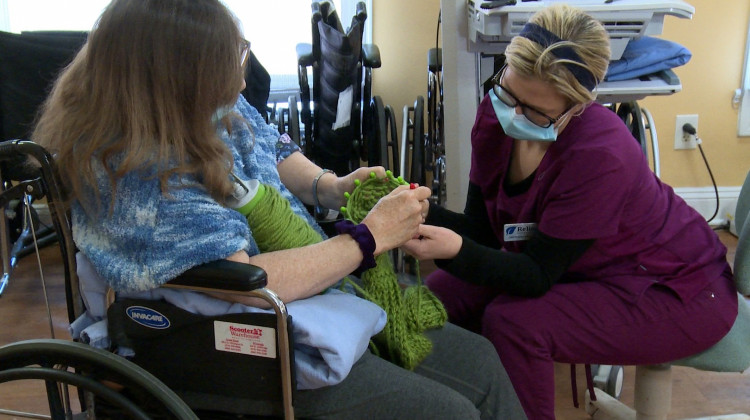
A worker at a South Bend nursing home helps a patient with a physical therapy exercise.
(Justin Hicks/IPB News)Monica Cummings is a licensed practical nurse in Elkhart. She said long before COVID-19, nursing home work often involved back-to-back shifts doing hard work with low pay. Nurses are simply fed up.
“We’re not going to work ourselves to death for peanuts anymore,” Cummings said. “There are a lot of nurses that have left and said 'I don’t care how much it pays.' And that’s sad.”
Add COVID-19 challenges to that and it’s easy to see why workers are leaving nursing homes in droves. In Indiana, about 16 percent of nursing homes report nursing shortages. Nationwide, it’s about 1 in 4. Many nurses who are staying in the profession are going to staffing agencies.
They offer flexible, short-term contracts – and lately pay a lot more. Zina Lowery, another nurse in northern Indiana, said right now she can make roughly $20 an hour more than when she was a nursing home staff member.
“We're gaining that power back. We're understanding our worth and knowing our power and we're negotiating that,” Lowery said.
The rise of 'mom and pop' staffing agencies
Staffing agencies exist to help companies fill vacancies. During the pandemic, both Cummings and Lowery noticed the higher prices staffing agencies could charge facilities for their labor. So both have filed business licenses in Indiana to start their own small agencies.
Lowery started iCare Staffing Solutions in April 2020. She said it was initially in reaction to being forbidden to wear a face mask at work early on in the pandemic. She and a coworker were aghast and left, using the company name to do occasional contracts. Now, they mostly do most of their work through larger, more established agencies, but hope to grow theirs in the meantime.
“We know the world,” said Lowery. “We know how everything functions, what goes on, what's going to make staff happy: incentives, flexibility, all of that. So we still have some things that we need to work on, but it's more of an independent contract.”
Jason Meyer, president of Medical Staffing Consultants, said he gets calls from nurses “every day” looking for advice on starting their own agencies. But he cautions it's not just as simple as filing a business license.
“I say ‘Do you have malpractice insurance? Do you have general liability? Do you have worker’s comp? Are you licensed in certain states that need licensing?’” he said. “There’s so many moving parts.”
But he’s seen nursing homes work with smaller agencies that may not have all the proper paperwork, because they want to fill positions and find lower prices. He worries it could be setting a dangerous precedent.
“Facilities in the pandemic [are] becoming really loosey goosey because of desperation … so they're not even asking for basic paperwork and due diligence,” he said. “I've never seen that before.”
Nursing homes accuse staffing agencies of price gouging
But some nursing homes officials say the rising rates they’re having to pay staffing agencies amounts to price gouging. Bernie McGuinness is the CEO of Majestic Care, a company with long term care facilities across the Midwest.
“To be blunt, I feel taken advantage of. Not even close to a fair market value am I being asked to pay. And that price just – it's unsustainable,” McGuinness said.
He said he wants to pay his nurses better and compete with staffing agencies. Through the pandemic, he said all staff got about a $5 an hour raise, they’re giving out free cell phones and even working with rental companies to cut staff’s housing costs.
But McGuinness relies on reimbursements from Medicare and Medicaid which haven’t kept up. So he’s at a disadvantage.
“We've seen our costs go up, you know, 10 or 11 percent each year during this pandemic in the labor standpoint, in some markets even more,” he said. “Reimbursement does not go up 10 and 11 percent a year.”
So, McGuinness wants lawmakers to step in and do something to control the rising costs.

The American Health Care Association and the National Center for Assisted Living have sent multiple letters to federal lawmakers, accusing staffing agencies of “exploiting the severe shortage of health care personnel … by charging uniformly high prices.”
Staffing agencies: It's just supply and demand
Chris Madden leads the Indianapolis-based staffing agency Networks Connect. He’s not opposed to staffing wage regulations, but said that alone won’t fix the limited supply and high demand driving up prices.
“The villain is COVID,” Madden said. “It's just the silent villain that you can't talk to, you can't reason with and we're just all – nobody knows what to do.”
Madden said staffing agencies have to compete against each other for fewer nurses demanding bigger paychecks.
“Can you blame them?” he said. “They're just saying, if this is what the market’s paying, then I want to get paid that too. They're not holding their care. They're just saying I want to be compensated for it.”
Jason Meyer, the staffing agency consultant, said he sympathizes with nursing homes, but contends it’s just a simple case of supply and demand.
“I think their anger needs to go someplace and it's understandable that they'll blame the agencies now because they always used to be agencies supplementally,” Meyer said. “But they're using them more now. It's always been something that they consider a necessary evil, [but now] the hate is adversarial.”
Expert: Whoever is to blame, the current trajectory is unsustainable
John Bowblis researches economics and geriatric care at Miami University in Ohio. He said federal CARES Act money going to nursing homes has helped some weather recent spikes in labor costs, but that’s not sustainable.
“If this continues on this way, you will see a large number of nursing homes that might have to declare bankruptcy,” he said. “Or the other option is, politically, that you have to increase reimbursement and a lot of states don't want to do that.”
Join the conversation and sign up for the Indiana Two-Way. Text "Indiana" to 73224. Your comments and questions in response to our weekly text help us find the answers you need on COVID-19 and other statewide issues.
Bowblis said it’s also really hard to prove if staffing agencies are price gouging. It all comes down to the difference between what those companies charge and what agency workers make in wages – but those numbers generally aren’t public.
"If that historical difference is significantly out of line, you know, then that's a potential for price gouging," Bowblis said.
A handful of states – including Minnesota and Massachusetts – have passed laws putting wage caps on how much staffing agencies can pay nurses. But in Indiana, we’re halfway through the legislative session and lawmakers haven’t discussed any solutions.
One bill was proposed to cap staffing agency charges to three times a "fair market value," but it didn't manage to get a committee hearing.
Join the conversation: Sign up for the Midwest Checkup by texting "Health" to 73224.
This story comes from a reporting collaboration that includes Indiana Public Broadcasting and Side Effects Public Media.
Contact reporter Justin at jhicks@wvpe.org or follow him on Twitter at @Hicks_JustinM.
 DONATE
DONATE






 Support WFYI. We can't do it without you.
Support WFYI. We can't do it without you.